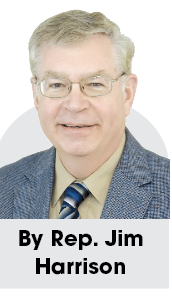 Last week marked the start of the 2024 Vermont legislative session. It also included the governor’s State of the State address to a joint assembly of House and Senate members. (Editor’s note: see page 1 for related story).
Last week marked the start of the 2024 Vermont legislative session. It also included the governor’s State of the State address to a joint assembly of House and Senate members. (Editor’s note: see page 1 for related story).
Scott opened with a quote from Governor Weeks’ second inaugural address following the 1927 floods. Weeks noted the true spirit of Vermont is its “indomitable courage in a time of adversity,” and that “the faith and valor of Vermonters has turned catastrophe into opportunity.”
Governor Scott went on to say, “This session, let’s honor their resilience and strength, kindness and generosity – not only in flood recovery, but by working together to address persistent problems, like demographics, housing, affordability, and recent increases in violence and crime.”
He used the address to explain why it is so critical for lawmakers to prioritize three key issues: public safety, affordability, and housing. With housing, he stressed the need to make changes to Act 250 to allow the building of more homes. Scott also called for reform to some of our laws relating to public safety, such as bail reform and holding criminals accountable for their actions. And he was critical of lawmakers for actions last year that increased taxes and fees on Vermonters despite his objections.
On the high cost of education, Scott suggested that the Legislature look at some of his past proposals to contain costs, such as further district consolidation, looking at class size and statewide contracts. He said, “With fewer than 83,000 Pre-K through 12 students, we’re spending about $25,000 a year per student, among the very highest in the country.” Scott cautioned lawmakers against raising other taxes, which in his view, just takes the money out of another pocket.
The governor also shared his concern about the new economic reality in Vermont. Scott indicated he will present a budget for the next fiscal year that grows at just 3%, in contrast to the 13% increase last year (last May’s budget bill was vetoed by Scott, which was then overridden by the Legislature). He called the upcoming budget “sobering” with historic one-time federal aid ending, lower revenues, another increase in our pension obligations, and last year’s spending decisions catching up to us.
Meanwhile legislative leaders had a somewhat different narrative. Speaker Krowinski spoke of the investments made last session, such as childcare, universal school meals, climate change initiatives and others, some of which the governor vetoed. Senate leader Baruth took issue with Scott’s call for removing some of Act 250’s barriers to development, saying it has proven to protect our state’s natural resources.
The Speaker also took a different view of the need for a budget cap, saying we should budget for Vermonters’ needs, not an arbitrary 3% limit.
However, there is an overlap of several priorities, including housing, public safety, and flood recovery. There may be different approaches, but the goals are similar.
In what hopefully is coincidental and not a sign of one-upmanship, the House voted to override the governor’s veto of the bill to expand Vermont’s bottle deposit system on the same day as his State of the State address last Thursday, Jan. 4. And Senator Baruth has announced the Senate will take their override vote on Jan. 23, which will make the bottle bill law. Jan. 23 happens to be the same day as the governor’s budget address to another joint assembly of lawmakers.
Other issues of interest:
Funding two safe injection sites, H.72, was advanced by the House Appropriations Committee Friday afternoon, Jan. 5, on an 8-4 vote. As I explained my “No” vote in committee, I would rather expand treatment options than provide space so that drug users can perform an illegal activity with immunity. The bill will be voted on by the full House this week.
There appears to be bipartisan support for considering a change to Vermont’s retail theft statutes. Under current law, shoplifting under $900 is a misdemeanor, whereas over that amount is a felony. Legislation has been introduced that would allow prosecutors to combine separate shoplifting offenses to charge the offender with a felony.
Barre and Montpelier representatives have introduced legislation asking the state to fund $85 million of flood recovery to their hard hit communities.
Taxpayers, through Vermont’s budget, will be covering the cost of the Attorney General’s settlement last summer with EB-5 investors to the tune of about $16.5 million. The first installment of $9.5 million will be included in this year’s budget adjustment bill.
State Treasurer Mike Pieciak is promoting a “Baby Bonds” initiative that would deposit $3,200 for each child born on Medicaid into a trust. The proposal, modeled after a new Connecticut program, is envisioned to help those born into lower income families, an opportunity to get a head start once they become adults. The annual cost is estimated to be $6.2 million to the state budget.
The House Education Committee received a report from the Agency of Education that estimates Vermont could face up to $6.3 billion in school construction needs over the next 20 years.
Despite the many challenges facing Vermont, the governor closed his remarks with a message to legislators, “Focus on the things that strengthen our communities, so all parts of our state can build upon their character and fulfill their potential. And together, all of us in this room and across the state will meet this moment, and all that comes next.”
Meanwhile, a Senate committee is scheduled to take up a new legislative compensation bill following a veto by the governor last spring. The tensions mount…
is the state representative for Chittenden, Killington, Mendon and Pittsfield. He can be reached at: [email protected] or harrisonforvermont.com.



